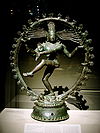| Part of a series on |
| Shaivism |
|---|
 |
|
|
Anava (Sanskrit: आणवा, romanized: āṇavā) (from "anu", meaning an atom or an exceedingly small entity) is a state - the consciousness of the ego, the sense of "I" and "mine". This represents a sense of individuality and a separation from a general existence of any "divine plan". One of the three bondages or pāśas: anava, karma and maya. In Shaivism, anava is the cause of the individual soul's mistaken sense of separate identity from Universal God Shiva, and the last bond broken before union (yoga) or self-realization (moksha). The three bondages are also explicitly discussed in the tantras of Shaktism.[1]
References[edit]
- ^ www.wisdomlib.org (2015-10-25). "Anava, Āṇava, Āṇavā, Aṇava, Ānava: 5 definitions". www.wisdomlib.org. Retrieved 2019-05-19.


Well, that’s interesting to know that Psilotum nudum are known as whisk ferns. Psilotum nudum is the commoner species of the two. While the P. flaccidum is a rare species and is found in the tropical islands. Both the species are usually epiphytic in habit and grow upon tree ferns. These species may also be terrestrial and grow in humus or in the crevices of the rocks.
View the detailed Guide of Psilotum nudum: Detailed Study Of Psilotum Nudum (Whisk Fern), Classification, Anatomy, Reproduction